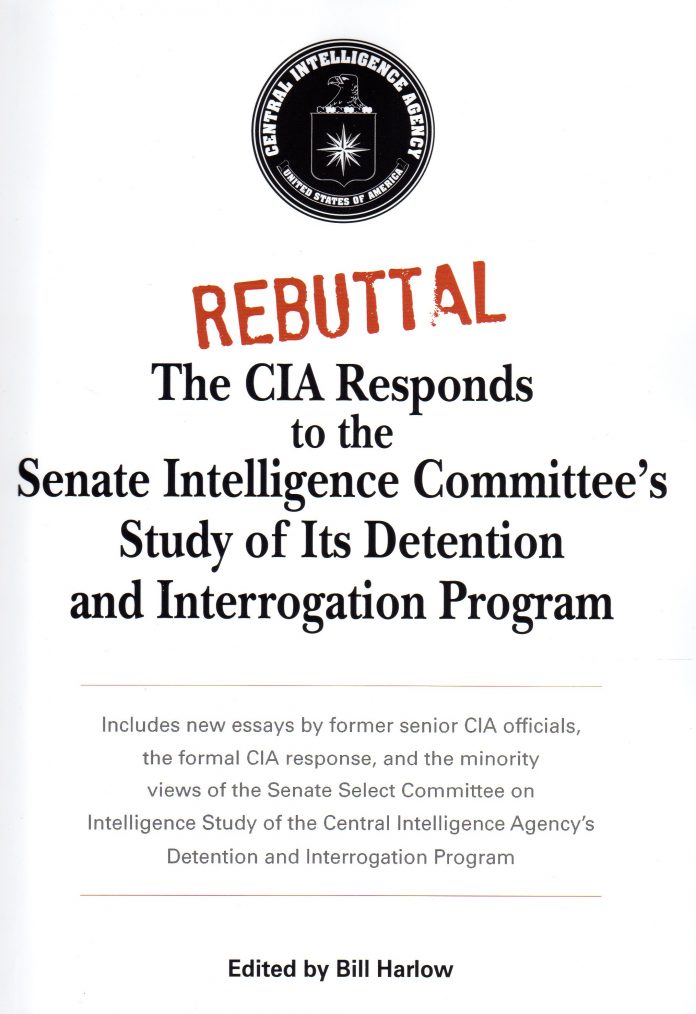
Rebuttal: The CIA Responds to the Senate Intelligence Committee’s Study of Its Detention and Interrogation Program. Edited by Hill Harlow. Naval Institute Press, Annapolis, 2015.
Reviewed by Andrea Argirides
IN December 2014, the United States Senate Select Committee on Intelligence (SSCI) released a 549 page executive summary of a 6000 page study – “The Senate Intelligence Committee Report on Torture: Committee Study of the CIA’s Detention and Interrogation Program”, examining the CIA’s detention and interrogation program of Al Qaeda terrorists detained post 9/11.
In early 2015, this study was released in book form and titled – “The Report on Torture”. This document in turn, resulted in the release of Rebuttal the CIA’s response to the SSCI study. Rebuttal has created much controversy and debate; it received mixed reviews, particularly concerning the efficacy of publication and whether it was at all necessary for the CIA to put forward its side of the story.
The contributing essays in Rebuttal are written by key officials within America’s Intelligence community, providing explanations, justifications and facts, on the effectiveness of its interrogation techniques, (what the SSCI refers to as ‘torture’). The eight authors include: George Tenet, Porter Goss, Gen. Michael V. Hayden, USAF (Ret.), John McLaughlin, Michael Morell, J. Philip Mudd, John Rizzo, and Jose A. Rodriguez, Jr. The eight essays in Rebuttal provide counter arguments to the Senate’s ‘torture report’. The work also includes responses of the Republicans on the SSCI, which interestingly were omitted from the initial SSCI study. These former senior CIA Officials, who served under the last three Presidents of the United States, having in-depth knowledge of the CIA’s detention and interrogation program, provide a range of responses from emotional outpourings through to cold, hard facts and straight forward ‘matter of fact’ responses addressing various key points raised by the SSCI’s report.
These CIA officials certainly don’t hold back, providing detailed responses and explanations against the Senate’s claims of ‘torture’ of detainee’s post 9/11, highlighting the flaws, omissions and biases of the SSCI committee. The key theme of the eight essays is that ‘interrogation saved lives.’ It is obvious from reading Rebuttal that the former CIA Director’s wanted to ‘set the record straight’; to quote George Tenet “no-one should blindly accept the Committee’s assertions without a careful reading of the rebuttals”, who also referred to the SSCI report as “biased, inaccurate and destructive”.
The eight essays are all well written and compelling reading. One of the key essays in the book is the chapter “Broken Covenant” by Jose A Rodriguez Jr, a 31-year veteran of the CIA, who actually ran the program. Rodriguez’s essay is raw, blunt and provides a tough response to Senator Dianne Feinstein’s report; Rodriguez presents a captivating essay that leaves the reader in no doubt that he feels betrayed by his own government.
In its totality, the CIA’s response to the SSCI study acknowledges the agency’s own mistakes and shortcomings , and went so far as to highlight the agency’s inabilities and lack of core competencies to conduct interrogation techniques appropriately and effectively. However, the reader is left with a definite sense that the latter’s interrogation program produced valuable intelligence that assisted in the prevention of future attacks planed against United States.
Rebuttal is a prodigious collection of immensely captivating essays and a gathering of detailed evidence, including actual declassified and redacted intelligence information and analysis. The book should be read in conjunction with the SSCI Report to gain the full value from this thought-provoking read.
A great book for those who want ‘the other side of the story’.



